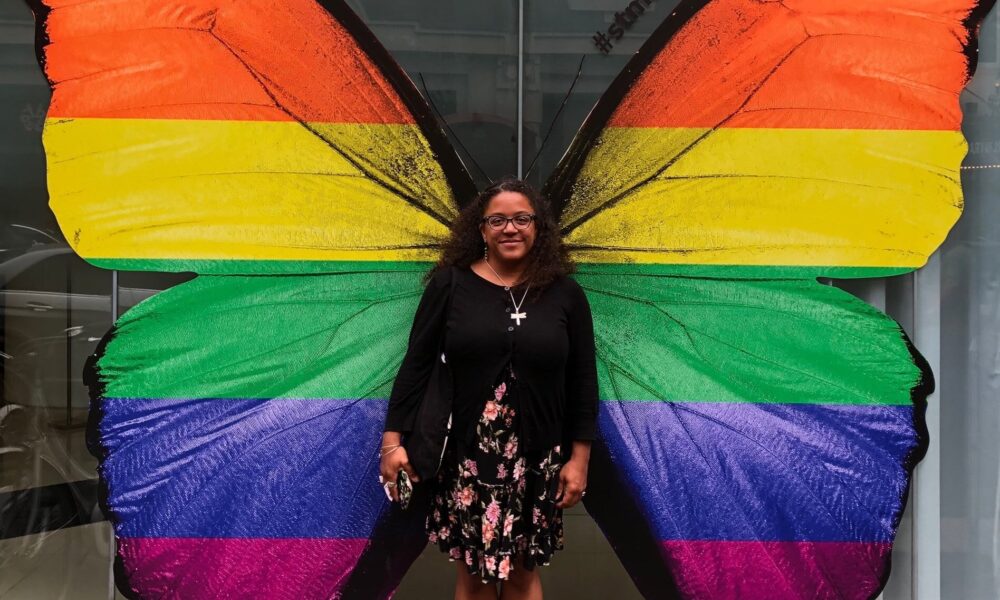On Oct. 1, McGill’s Macdonald Campus hosted Jessica Ware as the keynote speaker at the 2021 edition of Queer History Month at McGill. Ware is a professor of entomology at Rutgers University in New Jersey and a curator at the American Museum of Natural History. In her talk “Diversifying Entomology,” Ware brought attention to the lack of queer and BIPOC representation in the study of insects.
“When I was doing my studies and first entering academia, I was actually told not to talk about my Blackness or my queerness because people told me that scientists should not bring their feelings into their work,” Ware said. “That is one of many reasons why I strive to make my lab a safe space for a diverse group of people to work while staying true to themselves.”
Ware grew up visiting her grandparents in Northern Ontario, where she and her siblings enjoyed exploring the forests and flipping over rocks in search of insects. These childhood experiences fostered her curiosity, and eventually led her to earn a BSc in invertebrate zoology from the University of British Columbia (UBC), followed by a PhD in entomology from Rutgers University. Ware’s research focuses on the evolution of flight characteristics and behaviours in cockroaches, termites, and Odonata.
“For people who grow up without green space, insects are introduced as pests and are only seen in an urban setting,” Ware said. “I was very fortunate to grow up with access to vast green spaces where I was able to roam freely and experience insects with a sense of wonder and curiosity. When I got to UBC, I was introduced to so many incredible mentors, many of whom also happened to be queer, and they helped me explore entomology while showing me how to navigate being queer in STEM.”
While only 40 per cent of queer individuals in STEM are “out” in their place of work, Ware is part of a group of scientists working to change that statistic. She and her colleagues have created forums and scientific societies for BIPOC and 2SLGBTQIA+ scientists to meet and share their experiences and to open up the STEM fields up to a more socially and culturally diverse future. The largest effort has gone into 500QueerScientists, a collection of over 1,500 scientists working to provide the next generation of STEM students with queer role models.
In the field, Ware has encountered dangers in dealing with venomous insects—but also with being openly queer in spaces where that part of her identity makes her a target.
“I do a lot of work in Guyana, and it is a criminal offense to be queer there,” Ware said. “I realized early on that it is important to make safety plans for queer field workers, and that is something most straight scientists [do] not think about.”
In 2019, Ware was delighted to receive the Presidential Early Career Award for Scientists and Engineers (PECASE) after being nominated by the National Science Foundation.
“I come from a lineage of sharecroppers in the American South who were [denied] access to entomological knowledge by land owners who wanted to keep them in debt,” Ware said. “To need that information and not have access to it is a frightening prospect, and it is a big [turnaround] to go from that to being recognized by the government for my work.”
Ware’s field research and specimen collection expeditions have taken her all over the world to study the important role insects play in ecosystems and global cultures. The childhood wonder that initially attracted Ware to entomology continues to inspire her work in inviting more young minds into the field.
“There are millions of species of insects on Earth, and there are millions more that have not been discovered yet,” Ware said. “We need more entomologists in order to beat the anthropogenic changes to climate conditions that are leading to extinctions across the globe. We are losing biodiversity every day, and we need a diverse array of people and perspectives to document as many insects as possible.”









Great site indeed. You can post your blog whatever your niche will be.